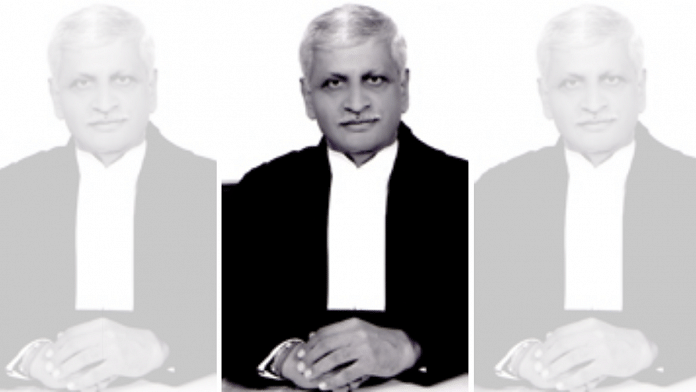New Delhi: Legal aid work should be incentivised and work carried out in this field by a lawyer should be given weightage when high courts or the Supreme Court assign the “senior” designation to advocates, Supreme Court Justice U.U. Lalit has said.
In an exclusive interview with ThePrint, Justice Lalit called upon fresh law graduates to take up legal aid cases that will give them an opportunity to showcase their work and help them get recognition in the field. He suggested doing away with an existing rule that allows only lawyers with five years of experience to take up legal aid cases.
“Legal aid to the poor does not mean poor legal aid. Legal aid must be of greater order and inspire confidence. A person who goes through this channel should not feel that his or her case will be handled shoddily,” the judge said, adding that new entrants to the profession with fresh ideas could be best suited to the job.
Under the corporate social responsibility (CSR) scheme, Justice Lalit suggested, corporate law firms should also extend support to legal aid. “It should not be made compulsory, but voluntary, where firms offer their services free for legal aid work. Even a small 5 per cent of their staff can be earmarked to do this job,” he said.
Also read: Important to reach people of all sections, says CJI Ramana at NALSA awareness programme
Outreach campaign on legal awareness
Justice Lalit is the chairperson of the National Legal Aid Services Authority (NALSA) that held a 42-day outreach campaign on legal awareness beginning early last month. Through this programme, multiple teams of NALSA connected with 6,37,000 villages in the country and visited each village thrice. NALSA says it has been able to reach at least 70 crore people through this campaign.
The campaign saw the involvement of lakhs of volunteers, including college students who held camps in villages to educate residents about government schemes and their legal rights. In Uttar Pradesh alone, there were one lakh teams on the ground, with each team having three members on average.
“Such interactions help NALSA to understand areas where intervention of a legal services authority is needed and what type of pending cases can be resolved through the lok adalats that are organised by NALSA and legal services authorities at the state and district level,” said Justice Lalit.
The physical outreach programme that commenced on 2 October manifested in many ways, with volunteers biking as far as 150 km each day in regions such as Ladakh.
At some places, NALSA engaged with the district administration to provide quick resolutions to problems faced by citizens. Justice Lalit recounted his personal experience in Kanyakumari where local residents prevented transgender people from burying their own community’s dead.
“Under the custom prevalent, transgender people bury the dead. But the village was not allowing them to access the burial ground, and the objection was that they belonged to the third-gender category,” the judge said.
But with the intervention of legal-aid authorities, the administration was persuaded to grant another piece of land so the community could have its own burial ground. “The legal services authority ensured it was done and the land was handed over in my presence,” Justice Lalit added.
Through the campaign, NALSA endeavoured to make people aware that there is such an organisation that they can reach out to when their rights are violated or ignored.
Also read: 21 states yet to decide on over 1,600 prisoner pleas for premature release — NALSA tells SC
Attracting young lawyers to legal aid
Among other things, NALSA provides legal support to the marginalised in court-based litigation where litigants are unable to afford advocates. It is this area that needs reforms to attract young, talented lawyers, Justice Lalit said.
On his suggestion, the Bar Council of India is now proposing to ask law colleges to adopt districts in their respective areas where fourth- and fifth-year students can interact with local residents and guide them in resolving their legal issues.
“If medical and dental courses mandate internships in rural areas, why shouldn’t law students be encouraged to do the same?” the judge said. It would be a learning experience for the students, and when they joined the profession, they would be more “prone to the legal aid framework” and not averse to the idea, he added.
Justice Lalit acknowledged that legal aid was not as remunerative as private litigation. Therefore, he added, it’s time that lawyers associated with legal aid are given institutional recognition.
“During my interaction with state legal services authorities, which are headed by sitting high court judges, I advised them to include a column in the form filled by lawyers who apply to become seniors. Legal-aid experience should be weighed in before aspiring lawyers are given this coveted recognition,” he said.
Virtual lok adalats
Justice Lalit said NALSA will now use technology to reduce pending litigation in courts. “NALSA organised two virtual lok adalats this year due to the pandemic, and there were more settlements on both occasions than in the sessions we had in pre-Covid times,” the judge said.
In July, NALSA mediated to settle 29 lakh cases pending in different courts across the country, and this figure rose to 42 lakh in September. “The last lok adalat held in pre-Covid times saw only 14 lakh cases settled,” Justice Lalit said.
NALSA is also working towards establishing permanent lok adalats to promote pre-litigation mediation. A pilot project saw 72 such adalats launched in Uttar Pradesh in July. “We are seeing how they function, and if the public develops confidence in them, we might replicate them in some other states as well,” he added.
(Edited by Rohan Manoj)
Also read: SC issues digitisation SOP to help dispose of cases quickly, starts process with 5 HCs



